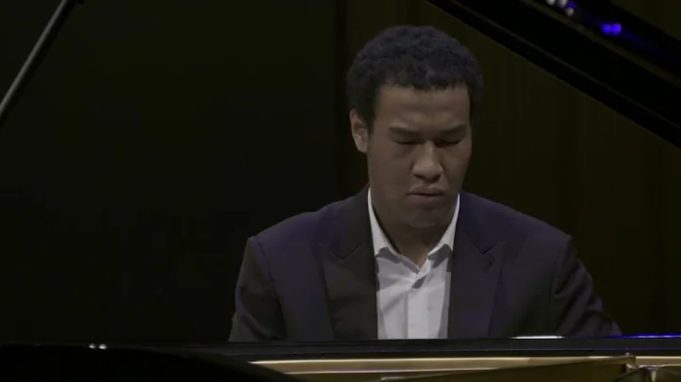Here’s the soccer update I promised yesterday: Wales ended Ukraine’s World Cup dream with a 1-0 victory in Cardiff. On one hand, I’m sad because the tournament would have been so much more interesting with Ukraine in it. On the other hand, had Ukraine won, they would have played against USA in the group stages, and I’m not keen to see our guys tangle with a talented team carrying that kind of motivation. I’d rather take our chances with the Welsh, even though the Dragons might just be better than Ukraine. As always, I’ll have a World Cup preview before the tournament.
Signs of life from Anna Geniushene to start the second round: Her otherwise too-careful set of Brahms’ Ballades suddenly finds some energy in that third number. It’s not just a one-off, either, because she follows that set with a rhythmically driven and idiomatic rendition of Bartók’s Piano Sonata. Andrew Li plays an all-variations recital: Beethoven’s Variations on an Original Theme and Brahms’ Paganini Variations. These showcase the young Massachusetts native’s flair for musical architecture, but the program could have used a barn-burner just as a sop for the audience. As Denis Linnik comes up, I’m struck by the fact that Belarus now has as many pianists left in this second round as Russia (two apiece). (Also, South Korea has as many as those two countries combined.) Linnik’s interpretation of Schumann’s Symphonic Etudes is oddly lightweight. He’s better with the mercurial mood shifts of Scriabin’s Fifth Piano Sonata and the nonstop virtuosity of Ligeti’s L’escalier du diable.
Masaya Kamei’s second-round recital is thoroughly underwhelming, with Bach’s Chromatic Fantasy, Liszt’s Mazeppa, and Rachmaninov’s Second Piano Sonata all lacking any sense of drama. Mazeppa is supposed to depict a Ukrainian page strapped naked to a wild stallion that’s left to run loose in the forest, and the piece sounds like a leisurely stroll in the park. Not so with Clayton Stephenson, who is electrifying in long stretches of Liszt’s brooding Ballade in B minor and Prokofiev’s apocalyptic Seventh Piano Sonata. He does have a bit of trouble integrating quieter passages into fast movements, but right now, he’s one of a handful here who’s playing well enough to win the whole thing. Albert Cano Smit’s recital suffers from a conceptual flaw: His Scriabin Étude in C-sharp minor is quite fine on its own, but it’s too similar to the items around it. Better playing might have alleviated this problem, but his Beethoven “Tempest” Sonata is too placid by half, and his version of L’escalier du diable (that piece again!) keeps stalling out.
I spend the break discussing the Stanley Cup playoffs with New York Rangers fans, whom I’m suddenly surrounded by. The Blueshirts wind up losing today, but I do hope they prevail in their series, because Tampa has had the Cup long enough.
Yuki Yoshimi’s program forces me to an inescapable conclusion: Brahms’ Paganini Variations don’t do it for me. The second reading of this work today is clearly the work of a first-rate creative mind, and it’s absolutely worth the trouble for pianists to learn it. Yet it leaves me cold, never touching the soul the way Brahms’ early and late piano works do. The other Belarusian pianist, Uladzislau Khandohi, plays Prokofiev’s Sixth Piano Sonata, completing the set of the composer’s “war sonatas,” the three masterpieces which were all inspired by the Soviet war against the Nazi invaders. Sadly, Khandohi’s Sixth misses the visceral impact of Clayton Stephenson’s Seventh or the structural integrity of Kate Liu’s Eighth. It’s not that he’s bad — in fact, he has incredible moments in his sonata — but the whole affair washes over you without leaving much.
The evening finishes with Sun Yutong. I spent yesterday reading over my bulletins of his performances from the 2017 Cliburn, and wow, I didn’t like his playing. It seems he’s gotten better in the last five years. (There are other possible explanations, but let’s go with the simplest one, shall we?) He begins with Carl Vine’s Five Bagatelles and finds the humor in the jazzy fourth one as well as strange beauty in the third and fifth (the latter titled “Threnody for all the Innocent Victims”). He follows that with a B+ performance of Chopin’s Fantaisie in F minor and a B-level version of Busoni’s transcription of Bach’s Chaconne. That isn’t great, you may point out, but there’s something to be said about being consistently at B-to-B+ level and occasionally better than that. If he keeps playing at this level, this is a Sun Yutong I can get behind.












